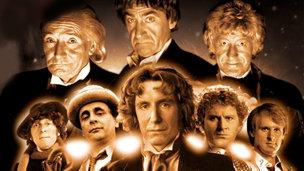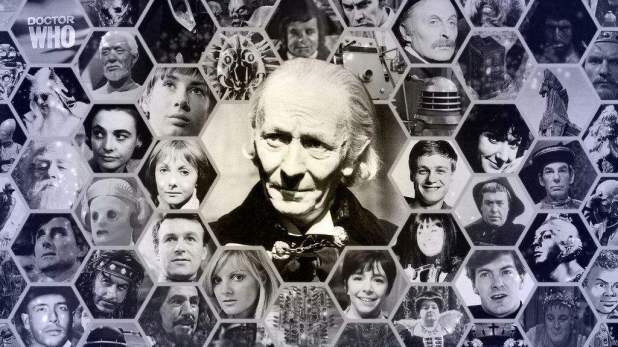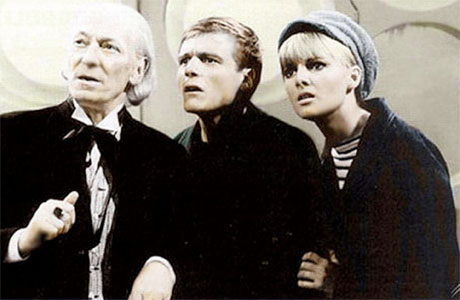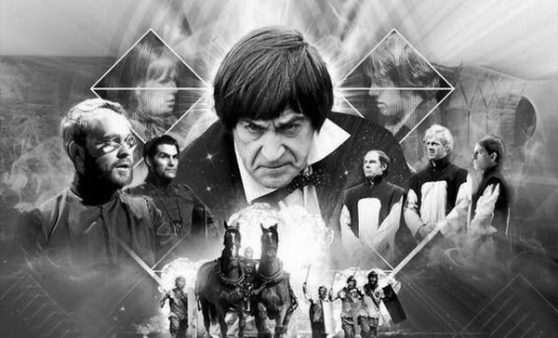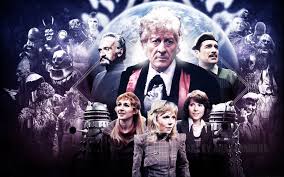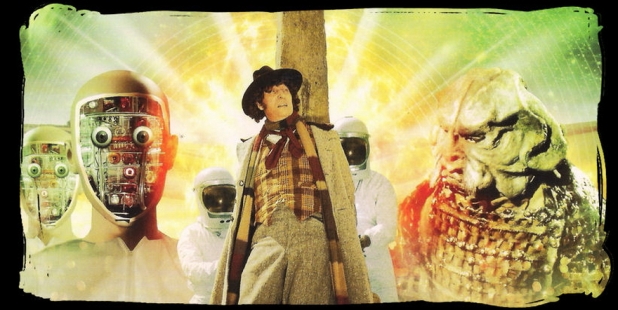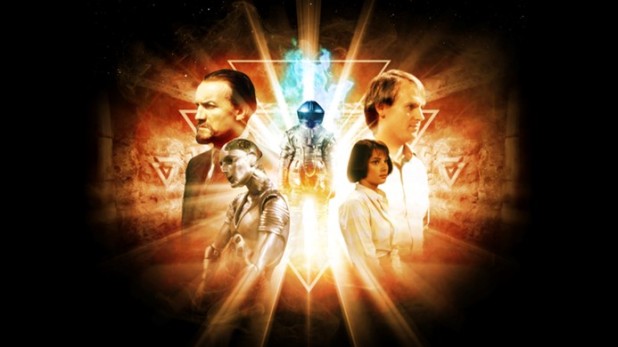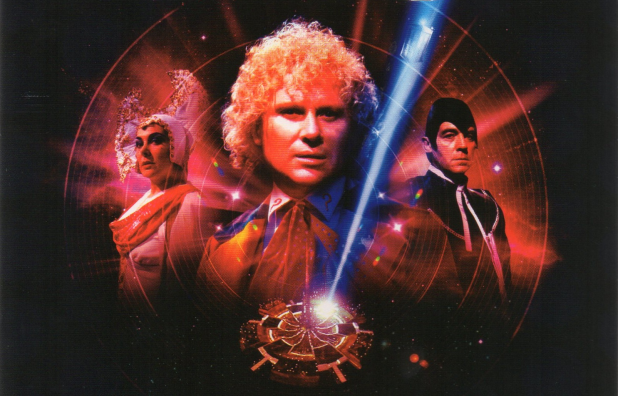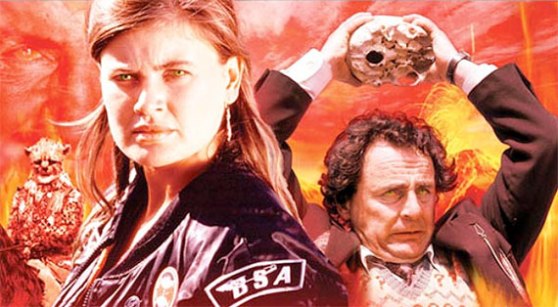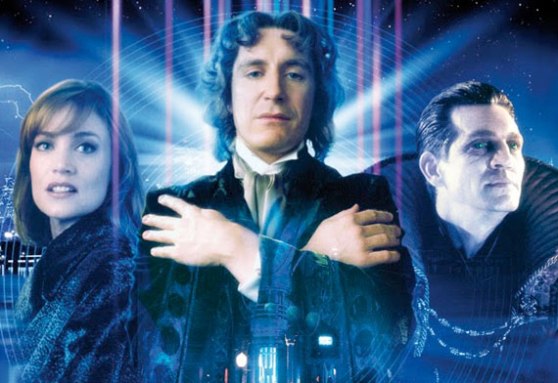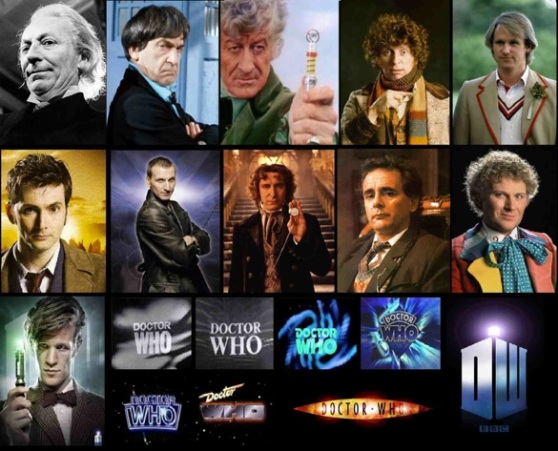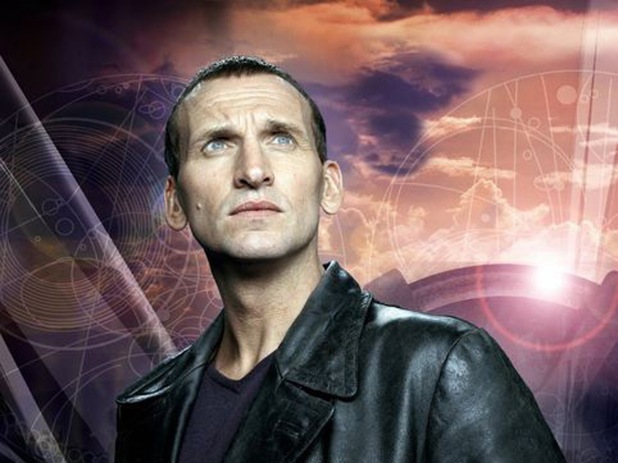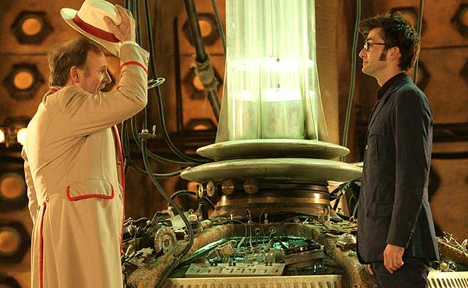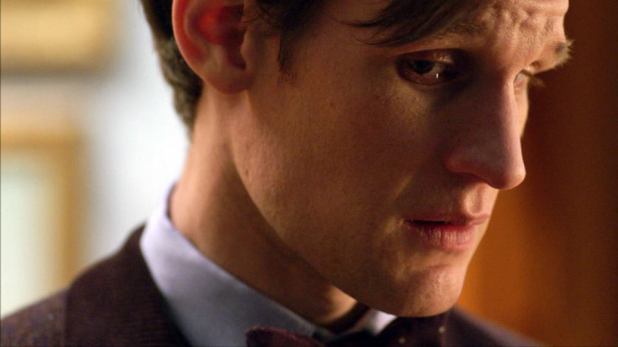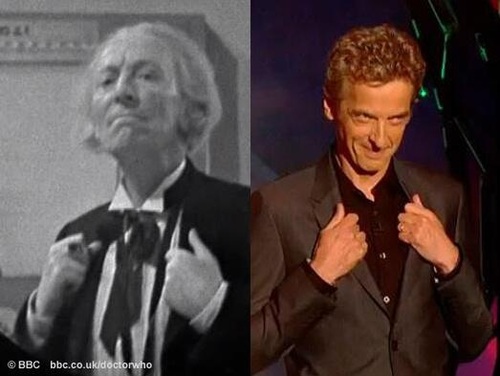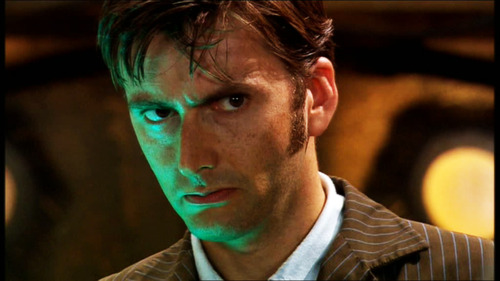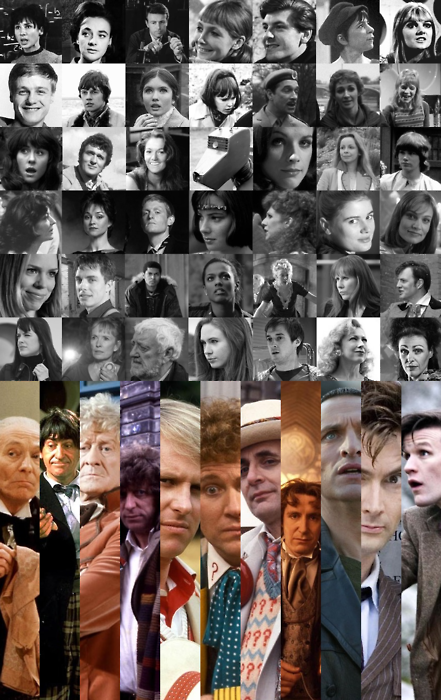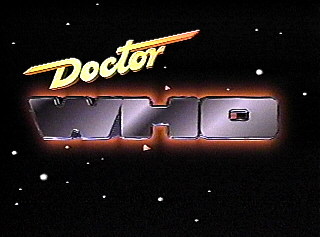We’re back, continuing our New Doctor Who rewatch! This week, we’re wrapping up Series Two with the final three episodes. We’ll examine the two-part Series Two finale, Army of Ghosts and Doomsday, in which we say goodbye (for now) to Rose Tyler; but first, we’ll examine one of Doctor Who’s most hated episodes, Fear Her. Let’s get started!
Spoilers ahead for anyone who has not watched these episodes!
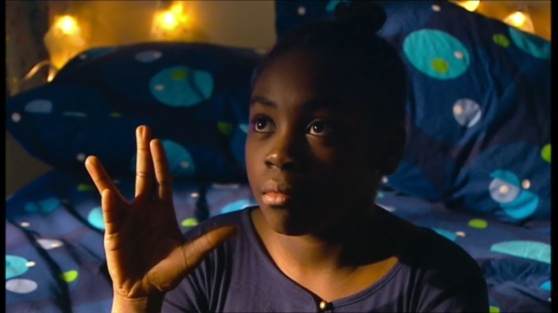
TARDISode 11 sets up the story with a clip from a sensationalist crime-tip show called Crime Crackers. It gives a quick overview about a case of several missing children, and also gives us the name of the street on which the story takes place, Dame Kelly Holmes Close. It closes with a glimpse of the monster in the closet of the main character.
It’s 2012, and London is hosting the summer Olympic games! In less than a day, the Olympic torch will pass through the neighborhood of Dame Kelly Holmes Close on its way to the stadium. The residents are preparing, but all is not well; several children have gone missing, all very suddenly. Rose and the Doctor arrive to see the games, but are distracted by missing-child flyers.
A girl named Chloe Webber lives on the street with her mother; her father is out of the picture, ostensibly long dead. Chloe loves to draw, but she has a secret: When she draws someone, they disappear, transported into her drawing. Rose, meanwhile, is attacked by an odd creature, resembling a large pencil scribble; the Doctor stops the creature, and determines that it isn’t real, but resulted from a strange residual energy. It’s not of Earth—and it leads them to Chloe. They talk with her and her mother, and the Doctor hypnotizes Chloe; he learns that she is being inhabited by an alien creature called an Isolus, which gives her her strange power. The Isolus are a long-lived swarm race; they are empathic, and thrive on their bonds with one another. This one, a juvenile, was separated from the swarm, and crashed its pod ship on Earth; it bonded with Chloe, craving emotional contact. It chose Chloe because they were both very lonely. It’s not evil, only hostile; and even so, it’s simply a defensive mechanism as carried out by a scared child. There’s a problem, however. Chloe’s loneliness is a result of years of abuse at the hands of her now-absent father; and she has drawn him on her closet wall—and the drawing has come to malevolent life.
The Doctor discovers that the pod ship can heal itself with enough heat and empathic connection. He returns to the TARDIS and puts together a device to locate it. However, the Isolus, clinging to Chloe, fears to leave; it makes her draw the Doctor, and he and the TARDIS vanish, breaking the device in the process. Rose is left to solve the crisis alone.
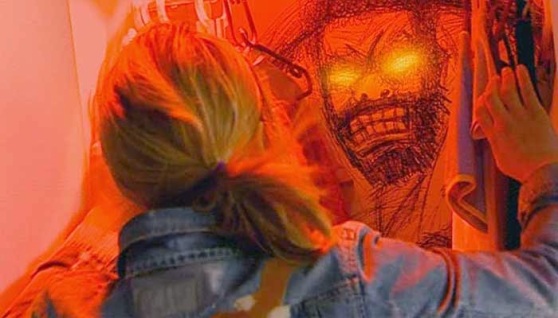
She deduces that the pod, when it crashed six days earlier, was attracted to the nearest heat source—a patch of fresh pavement. She digs in the spot, and finds the pod. She returns to Chloe, but the Isolus is trying to draw the whole world—six billion people—so it will never be lonely. She sees the drawing of the Doctor, which has changed—he is showing her the Olympic torch, which is passing by at that time. Rose throws the pod into the torch, which is not only representative of heat, but also the emotional attention and connection of everyone watching—and it restores itself. The Isolus leaves Chloe and returns to the pod, releasing everyone in the drawings.
One thread remains unresolved. The malevolent drawing in the closet, no longer restrained, is now coming to kill Chloe. Rose is instrumental in helping Chloe to use the last of her power to banish it.
Still, the Doctor is missing. Rose thinks he is lost forever—until she sees him on television, reclaiming the dropped torch, and lighting the Olympic flame.
Although I wouldn’t call it a favorite episode, I’ve struggled to understand what it is that makes this episode so reviled. It seems very average to me. It’s hampered a little by the fact that it lacks a cohesive villain; Chloe and the Isolus are lonely and damaged children, but they aren’t evil—the harm they cause is more selfish, and more of a defensive mechanism. I suspected that the dislike was due to the absurdity of the episode; but there are far more absurd stories out there (like, for example, Love and Monsters, which I covered last week). The episode does concern child abuse as a secondary theme, which I will admit does not translate well to television entertainment (and rightly so); but it’s downplayed somewhat here. In fact, it could have been omitted entirely without harming the story; the subplot with the drawing in the closet was unnecessary at best, and awkward at worst. (The drawing and its behavior is a bit overdone, but that makes sense in context—it’s not what really happened to Chloe, it’s her childhood perception of it.) But again, this is nothing new—many episodes try to do too much in the allotted time, many of them better received than this.
This is another episode, like Father’s Day, where the Doctor actually loses, and it’s up to the companion to save him. Those stories don’t come often, but they’re always interesting to me; the Doctor’s life, phenomenal as it is, truly hangs by a thread sometimes. Here, Rose wins the battle, but it’s more or less by chance; it hangs on the fact that the torch procession was passing by at that moment, which is a little too much coincidence perhaps. I did have to wonder why Chloe removed the Doctor and the TARDIS, but not Rose; as Rose was the one who invaded her bedroom earlier, I would think she would see Rose as an equal threat.
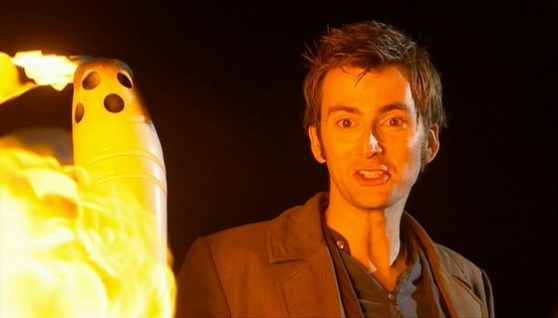
In the real world, David Tennant of course did not appear at the Olympics in 2012, or carry the torch; however, Matt Smith (as the Eleventh Doctor) did, giving a bit of poetic finality to this appearance. In universe, the Doctor makes a Star Trek reference to the Vulcan hand sign; when he hypnotizes Chloe, he does it in a way that mimics the Vulcan mind meld. We get a few continuity references: the Doctor refers to the nuns from New Earth, and says he’s not a cat person. He mentions the Shadow Proclamation, as he has done a few times before, notably in Rose. He refers to his lost family, stating that he was a dad once; the last such reference was in The Empty Child/The Doctor Dances. The year 2012 was last visited in Dalek and its sequel, The Long Game; failed companion Adam Mitchell hails from that year.
This episode, I will admit, is logically weak, for reasons that I cited above. It is an engaging story, in my opinion; it’s made all the more emotionally weighty by the realization that our villains are really just scared, lonely children. It could benefit from some tightening, however, and from trimming out the closet-drawing plotline. Otherwise, it’s not too bad—the low point of the series, perhaps, but still acceptable.

TARDISode 12 is a brief recap of the Torchwood references throughout the series. It is presented as a journalist submitting a story to his editor; at the end, the journalist is taken away by Torchwood agents and committed as insane.
In Army of Ghosts, the Doctor and Rose return to 2007 to visit Jackie Tyler; but they are shocked when Jackie reveals the presence of a visible ghost, ostensibly that of her father. The ghosts are all over the world, and appear at the same times every day, remaining for a few minutes at a time. It’s been going on for months, to the point that people accept the ghosts as normal now.
Strange things are happening elsewhere in the city, as well. At the Canary Wharf skyscraper—called “Torchwood Tower” by its insiders—a strange sphere resides in a sealed lab, under analysis by scientist Rajesh Singh. It has no mass, no radiation, and all scans fail to detect it—it’s as if it doesn’t exist. It does display some kind of barrier that prevents touch. Elsewhere in the tower, it is revealed that Torchwood is responsible for the presence of the ghosts; under leader Yvonne Hartman’s direction, a large machine with two levers is used to make them appear and disappear in an event called a “ghost shift”. Two of her workers, Gareth and Adeola, are clandestinely seeing each other; on one of their rendezvous, they go to a plastic-sheeted area under construction. Adeola vanishes, confronted by a Cyberman. Later, she and Gareth return to their desks, now wearing Bluetooth devices on both ears.
Jackie confronts Rose about her potential future, and they argue. The Doctor assembles a device; and at the next ghost shift, he traps one of the ghosts briefly for analysis. He traces the disturbance to Torchwood; but Torchwood has also located him, and recognized the TARDIS. The Doctor and Rose—with Jackie unwittingly still aboard—take the TARDIS to Torchwood tower, where the Doctor is promptly taken prisoner. He passes Jackie off as Rose, leaving Rose on the TARDIS, which is moved to a basement. Hartman claims the Doctor and the TARDIS as property of Torchwood; their motto is, “if it’s alien, it’s ours.” She also claims credit for destroying the Sycorax, using alien technology.
Adeola leads another worker to be taken by the Cybermen. Meanwhile, Hartman explains about Torchwood’s existence, and takes the Doctor and Jackie to view the sphere. Several times, beginning here, the Doctor wears 3D glasses, though he doesn’t explain it yet. He explains that the sphere is a voidship, which travels through the void outside the universes; the Elementals once called the void the Howling, and others have called it Hell. He recommends sending it back where it came from, but how? Hartman explains that it came through at a point now housed in the building’s upper floors, behind the mechanism seen earlier; she shows him. She says the ghosts came after it, and they have been experimenting since. The Doctor cautions them to stop the ghost shifts, as it may destroy the universe with a little more strain; finally Hartman breaks and cancels the next shift. However, Adeola and the other converted workers restart the countdown.

Rose—the real Rose, that is—sneaks into the sphere lab, but is caught. However, she gets a shock: Singh’s lab assistant on hand is Mickey Smith! He explains that the Cybermen were nearly defeated in his world, but that they suddenly vanished, only to be detected here. With the sphere having opened the breach, not only can the Cybermen pass through, but also, his world’s version of Torchwood developed a technology to pass through—and Mickey is here on reconnaissance. He believes the sphere is occupied by Cybermen, and prepares to blast them—just as the sphere starts to open.
Upstairs, the ghost shift starts. The Doctor realizes what has happened, and stops the earpods on the workers; they collapse, already dead. But the shift is already under way, at higher power than ever before. The ghosts appear fully, all over the world, and are revealed to be Cybermen. They begin to attack.
Downstairs, the sphere opens, revealing a terrible sight: a strange machine, and four Daleks. Their leader gives the command to exterminate the humans.
TARDISode 13, the final entry for the series, shows a new broadcast about the Cybermen incursion. It is interrupted…by Daleks.
As Doomsday opens, the Daleks are about to kill Singh, Mickey, and Rose, when Rose reveals her knowledge of the Daleks and the Time War, causing them to stop. The Dalek leader decides to keep her alive, but kills Singh after extracting information from him. It refers to the machine as the Genesis Ark.
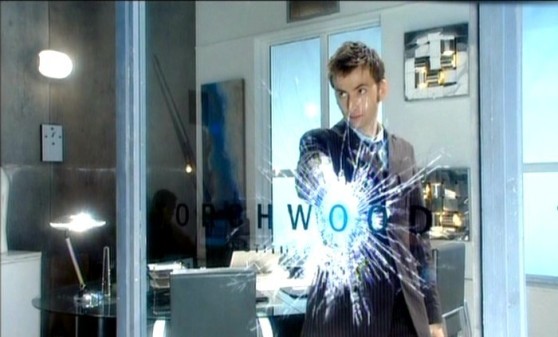
The Cybermen have likewise captured Jackie, Hartman, and the Doctor. They broadcast a message demanding surrender, stating they will upgrade everyone on Earth; but a battle is breaking out between the British Army and the Cybermen in London. The Cyberleader notices the presence of the Daleks, and sends a few Cybermen to investigate. The Doctor watches the confrontation—which represents the height of attitude on the part of both Cybermen and Daleks, incidentally—and realizes the stakes have just risen. Declining an alliance, the Daleks determine to destroy the Cybermen as well as the humans; they kill the advance Cybermen. Seeing Rose’s reactions, they press her for information, and she identifies the Doctor, which scares the Daleks (as much as they ever feel fear, anyway).
Jackie and Hartman are taken for conversion. Hartman is converted, but before Jackie can be upgraded, a group of soldiers appear and take out the Cybermen in the breach room. The group is led by Jake, formerly of the Preachers, from the alternate universe. Jackie gets free and escapes. Jake fills the Doctor in on the transport devices they use, and recent history. Pete Tyler arrives, and takes the Doctor back across to his world’s Torchwood Tower, where he explains further: though Britain is enjoying a golden age, temperatures are rising catastrophically, which they have determined is due to the breach. He enlists the Doctor’s help in defeating the Cybermen (and the Daleks too, though Pete doesn’t know them) and closing the breach. He explains that in his world, it’s been three years, where here it was only about one year. They then return.
The Daleks reveal that the Genesis Ark is of Gallifreyan origin, and that it contains “the future”. They try to get Rose to touch it—thus providing time energy to open it—but are unsuccessful. The Doctor arrives, and banters with them, identifying them as the Cult of Skaro, a Dalek “think-tank” of sorts that disappeared from the Time War. Now he knows how they escaped, in the voidship.When they threaten him, he uses his Sonic Screwdriver to destroy the doors of the lab and let the team from Pete’s world in to fight the Daleks. Mickey is bumped into the Ark; as he has also been a time-traveler, this is enough to open it. It levitates into the sky, and it is revealed that it is bigger on the inside; it disgorges millions of Daleks who were imprisoned inside. The Daleks and Cybermen begin to battle each other.
Jackie reconnects with them, and sees Pete for the first time, instantly upsetting his determination not to connect with her. Pete wants to escape back to his world, considering the situation lost; but the Doctor reveals that his glasses show a sort of trace of the void on everyone who has traveled into it. He can use the machine to suck those traces—and everyone who carries them—back into the void, eliminating both Daleks and Cybermen; but the humans must get clear first. He sends Jackie and Rose with the others, against Rose’s will—she knows that when the breach closes, she will never see the Doctor again. He himself may be pulled in, too. She instantly teleports back, and begins to help him with the machine. Meanwhile, the converted Hartman guards the door, her sense of duty overpowering her conversion. (It’s not shown what happens to her afterward, but presumably she is pulled through—she never traveled through the void, but her cyber body would have been brought through with the advance guard.)
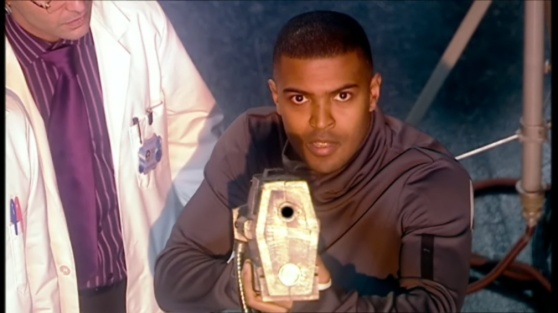
The Doctor puts magnetic clamps on the walls to cling to; then he and Rose activate the levers. Daleks and Cybermen are pulled in. Rose’s lever breaks free, however, and she is forced to grab it and lock it in place. She loses her grip and is pulled in; but Pete teleports across at the last second, grabs her, and teleports back out. She is left trapped in the alternate universe as the breach seals.
Months later, in Pete’s world, Rose sees the Doctor in a dream. She follows his directions to a beach in Norway called Darlig Ulv Stranden, which translates to “Bad Wolf Bay”. She sees the image of the Doctor there; he is using a rapidly-closing crack in the universal wall to contact her, burning up a supernova to do so. He tells her goodbye, and she admits to loving him; he is about to say the same, but vanishes before he can get the words out.
In the TARDIS, he takes a moment to mourn the end of their time together; but he is interrupted by the sudden appearance of a woman in a wedding dress. “What?!” is all he can say.

This series finale rivals The Parting of the Ways in many ways. While we don’t see the Doctor regenerate, we do so a total change in supporting characters. Rose departs (quite against her will, I might say), taking with her Jackie, Mickey, and Pete, all of whom had reached semi-regular status. We’ll see some of them again in cameo form, but their traveling days are over, so to speak. Interestingly, both of the Tenth Doctor’s future regular companions appear here, in one form or another; Freema Agyeman, who will play Martha Jones, plays Torchwood staffer Adeola Oshodi, who will later be retconned as Martha’s cousin. Catherine Tate makes her first appearance as Donna Noble, though her name is not yet revealed. This story also provides the resolution of the season-long Torchwood arc, ending with the downfall of Torchwood One. That destruction, later called the Battle of Canary Wharf, leads to the rise of Torchwood Three in Cardiff, which features in the spinoff Torchwood, and features the return of Captain Jack Harkness. (In related news, keep an eye out for Big Finish’s upcoming “Torchwood: Before the Fall” audio set, which is set at Torchwood One prior to this story. Personally, I’d love to see Yvonne Hartman square off against Kate Lethbridge-Stewart of UNIT—Big Finish, get on this!)
I find it interesting to observe how series finales go in Doctor Who. The classic series, with its more episodic/serialized format, rarely used season-long story arcs, and when it did it was often not well received (Trial of a Time Lord, anyone?). The revived series does use such arcs, but I can’t help feeling that it lives with the memory of cancellation; therefore every series arc neatly wraps up all of its threads. It doesn’t always end happily, as is evident here; and sometimes some of those threads are picked back out by later specials (I’m looking at you, Time of the Doctor, with your crack in the wall); but every series finale constitutes a point where, were the series as a whole to end, we could be mostly satisfied. This one is no exception; again, as far as we know, the Daleks and Cybermen have all been wiped out, and the Doctor is alone, with Torchwood visibly destroyed, and with no companions with whom he has unresolved business. The appearance of Donna at the end doesn’t negate that resolution; it just gives us a tag on which to hang the next series, should the next series come.
I won’t go into references to this series’ episodes, as we’ve discussed them as they came up. However, there are some references to previous episodes. The cutting-through-plastic by the Cybermen is a nod to The Tomb of the Cybermen. The Time War gets a significant reference, and the Fall of Arcadia is first mentioned here; it will be expanded upon in The Day of the Doctor. The Void, under one name or another, will be mentioned in several future episodes (Daleks in Manhattan, The Next Doctor, The Big Band) and several audios. The Elementals were last referenced in Enlightenment; they call the Void “the Howling”, which may be a reference to the “Howling Halls” mentioned in Love and Monsters. Rose mentions the Gelth, last seen in The Unquiet Dead. We get a flashback glimpse of a planet we haven’t seen before, as Rose is talking to Jackie—that adventure was never recorded. Harriet Jones is mentioned, having maintained her rise to power in Pete’s world. The Doctor mentions being at Pete and Jackie’s wedding; but if this is a reference to Father’s Day, it’s incorrect, as that was someone else’s wedding. We get the first appearance of the Doctor’s “Allons-y!” catchphrase, which appears many times in the future. While the rift at Torchwood Tower is not the same as the one at Cardiff, the idea of opening and closing it at will is carried over into the Torchwood series.

There’s little to complain about here. This episode will have echoes through several upcoming series of Doctor Who, and through Torchwood as well. Overall, it’s a strong, emotional exit for Rose and company, and it adds depth to the Doctor, as he deals with the loss of Rose through the next few companions. Otherwise, at this point, the future is unknown, and the sky is the limit—and we have a wedding to catch.
Next time: The 2007 Christmas Special, The Runaway Bride! See you there.
All episodes may be viewed on Dailymotion; links are below.




